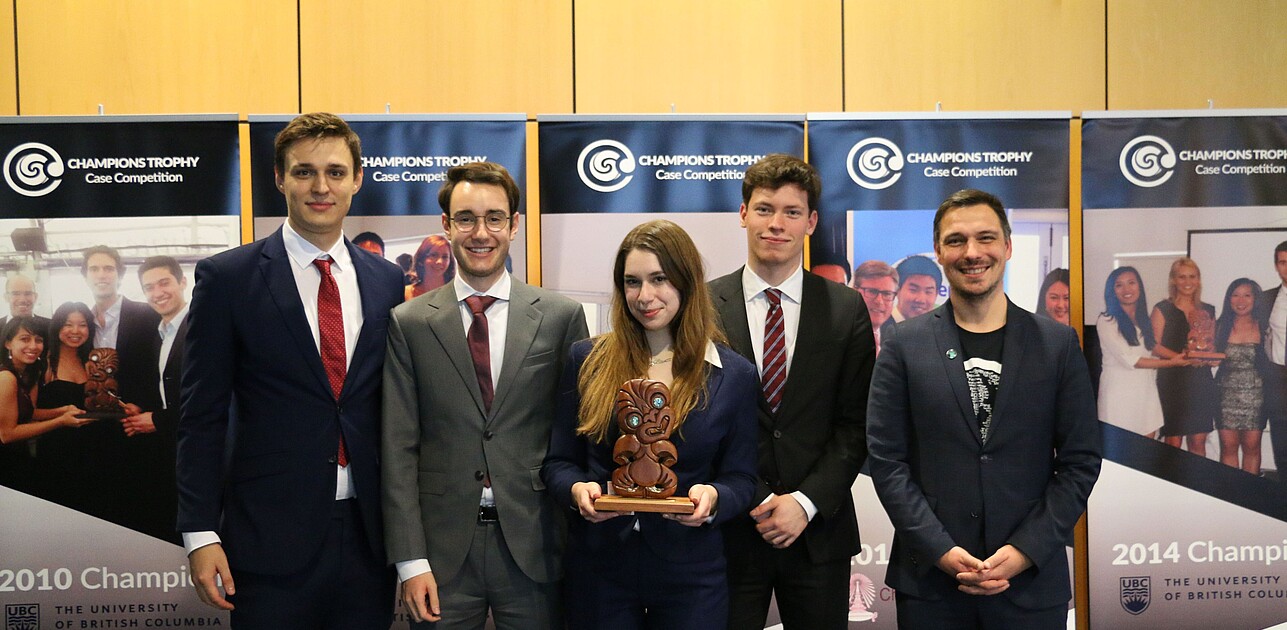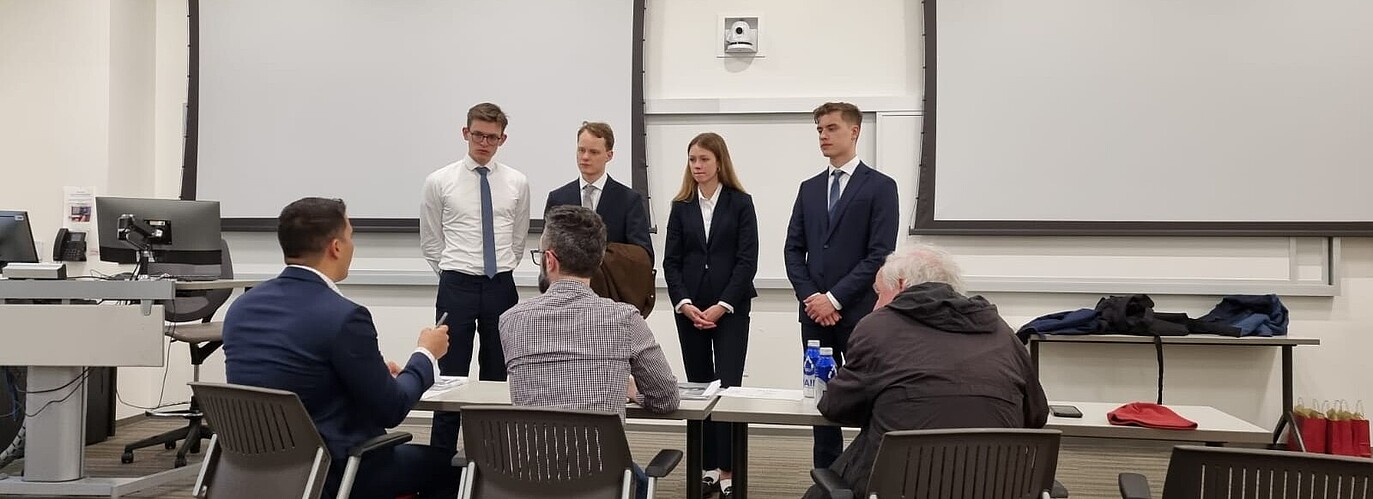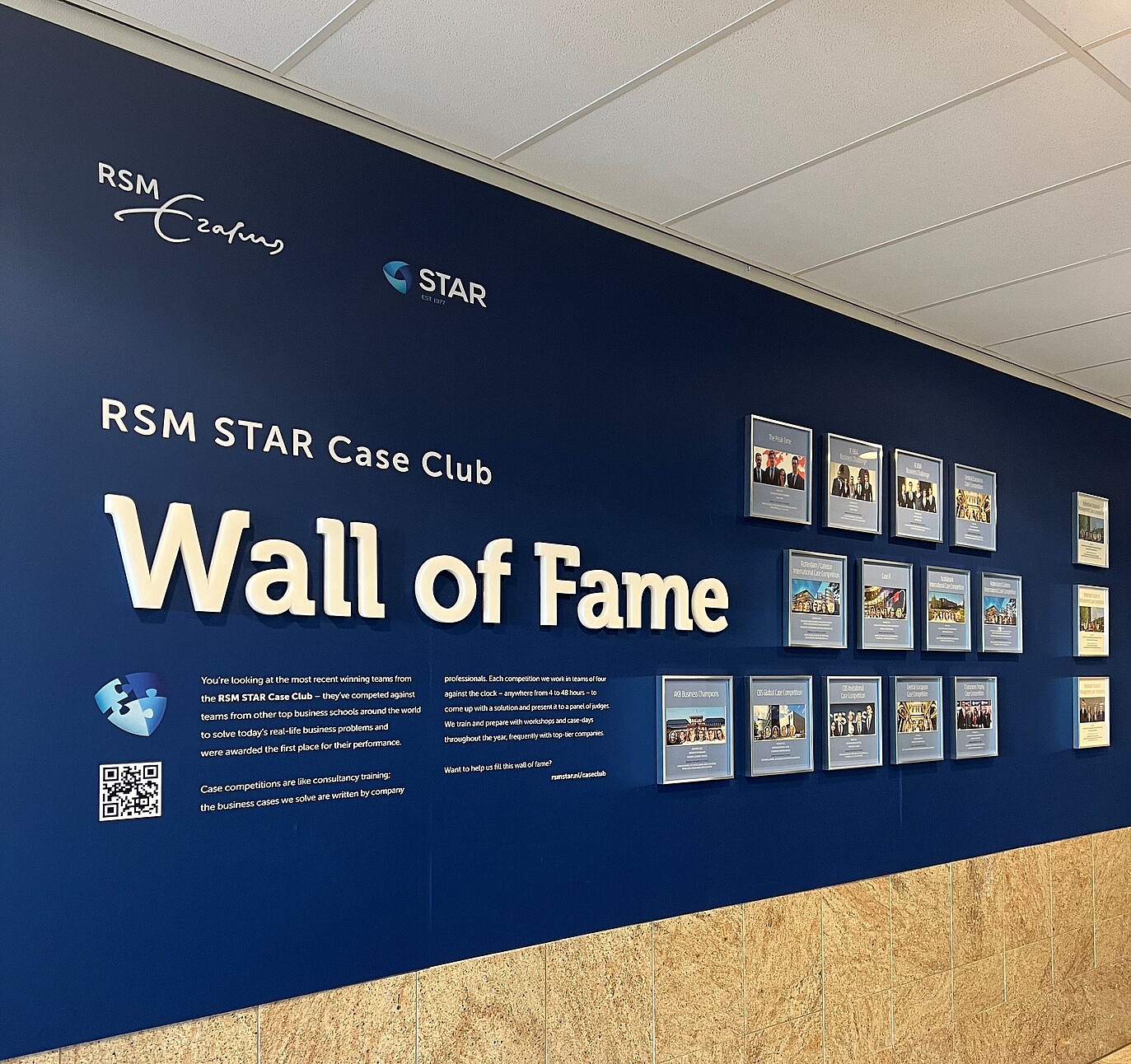

Reading time: 10 minutes
In an ecosystem where positive impact is achieved through engagement, the Case Club at Rotterdam School of Management, Erasmus University (RSM) is a shining star. The Club has become an increasing source of impact for RSM – a way for RSM students to demonstrate their fresh and impactful knowledge to benefit all kinds of companies, as well as creating channels for companies to connect with RSM and its highly gifted and motivated students. RSM STAR’s Case Club teams have been enormously successful; they recently won the world title at the Champions Trophy Case Competition in Auckland in New Zealand in January 2023.
Competing in case clubs began at RSM back in 2005, when a team of four students participated in a case competition organised by Copenhagen Business School. After that, bachelor students in particular were keen to do more, to satisfy their urge to participate in activities outside of the curriculum and enjoy the challenge. Linda de Vries, former head of RSM’s International Office, says: “We’ve always had a lot of ambitious students with a high grade-point average and they were telling me they wanted to do them.”
These victories made RSM realise there was value and prestige in participating: the competitions represented an opportunity to demonstrate the quality of students and thus the quality of the school itself.
In 2014, students approached De Vries asking if RSM could organise its own case competition, to which students from all over the world could be invited. Students from RSM STAR, RSM’s student-organised study association – and the largest of its kind in Europe – organised the first RSM STAR Case Competition in Rotterdam in 2015.
Recalling the first RSM-organised competition, CEO of AON Nederland at the time, one of the participating companies, Marc van Nuland, says: “Being involved in a 24-hour case was remarkable, and what the competing teams could do was remarkable. Our case was about a marketing topic. At that time AON was mainly focused on corporate business-to-business markets. We also had quite a portfolio of personal lines insurance, but we weren’t really experienced at marketing this side – and the input we received was amazing. The analytics, the financial aspects and the way they presented were all excellent.”
Van Nuland says AON was motivated to join in because – surprisingly – the company doesn’t use a lot of external consultants, instead using its large number of staff in-house. “I heard about the competition as a member of the RSM Advisory Board and thought it would be very useful to participate. I’d recently been appointed CEO and wanted an outside-in view of the company. That came not just from the students but also from the supporting staff, including the RSM Case Development Centre with whom we worked very closely to develop the business case the competing teams would tackle.”
While students might say they’ve ‘cracked’ a case that sets out a study of a company’s strategic challenge by designing the next steps in strategy, Van Nuland sees it through senior management eyes: “I saw it more as advice: this is the situation at AON; we need to do more, so based on the analytics and some benchmark insights, give us your advice on how we can take the next steps. That was the main focus for me, and the advice we received from the teams was very helpful.”
There’s deep involvement from RSM faculty members throughout the competitions. Otto Koppius, assistant professor of business analytics in RSM’s Department of Technology and Operations Management, became involved with the Case Club in 2014 as a faculty adviser providing support, feedback and mentorship to the members, as well as travelling to case competitions with the RSM team: “As a faculty adviser I’m not allowed to have any contact with the team while they are solving a case, but I am allowed to watch all the presentations made by the competing teams. This means I get to see the whole spectrum of case presentations, including those made by our own team. I debrief the team after each case, talk about the process, the content, give them feedback about how they performed relative to the other teams, and help them improve for the next case, which might take place the following day or the day after that.”

Case competitions enable RSM and its Case Club students to have purposeful engagement and create tangible impact by tackling business challenges faced by companies. “When companies participate in a case competition it gets them out of their comfort zone,” says Koppius. “As a result of the case competition presentations they get perhaps 16 different ideas and sometimes companies are really challenged by them. They wonder why a team is looking at a particular solution. Why are they focusing these elements? Why are they looking at it from that angle, or why are they taking that approach?”
What Koppius often gets back from companies is that even if the overall solution from one particular team is not entirely feasible, there's almost always something in there that makes the company stop and think about its own strategies. “Part of the whole case process is to disrupt the way the company thinks; make it reappraise the way it approaches challenges.”
Also, the nature of the cases can often be aligned with RSM’s mission to be a force for positive change. Koppius says: “We often have cases aligned with RSM’s mission and document situations where a company wants to create positive change linked to one or more of the UN Sustainable Development Goals. We look beyond scenarios where a case might simply be to develop an advertising campaign for product XYZ. That’s not big enough or challenging enough and it lacks real impact. Showcasing and helping companies that want to make a positive change is something particular to the RSM Case Competition.”
Companies respond positively to that because typically creating positive change is something they’re struggling with. “In several cases,” Koppius says, “we've heard from companies that have said yes, we can actually use some of the solution elements that have been put forward. And often the engagement between a company and the School lasts longer than just the week that they had for the competition.
The Case Club uses a training programme developed by Koppius and a mixture of workshops presented by faculty members, and alumni who come from consulting firms and have expertise in particular areas of business or problem-solving methods – which is where the students’ professional adeptness in consulting techniques comes from.
One of the most important skills is to be able to deal with time pressure in competitions – which are usually 6-hour or a 24-hour cases: one of the most important skills is the ability to quickly determine the core of the challenge and the core of the solution.
As well as honing in quickly on problems and solutions, students learn a lot about teamwork under high pressure – and they need convincing storytelling skills. They learn to present a solution in a coherent way, and become able to integrate distinct pillars of learning – their course on marketing or finance or strategy or technology – into their solution.
The Case Club and everything it does is very much led by the students themselves, including how new members are brought on board, trained, and developed.
As soon as a team is selected for a competition, they begin internal training sessions to practice case solving beyond the general training that the Case Club provides, and to find out what their strengths and weaknesses are.
For Jasper Rijnders, case analyst for STAR Case Club and chairman in academic year 2022-2023, being student-led makes the Club unique, especially when compared to other clubs around the world.
“Of course we receive great help from RSM, both financially and at an advice-based level, but all our day-to-day operations are run and led by students,” Rijnders says. “We have a board of 11 people, all bachelor students. Four of those are on what we call the incoming committee and are fully in charge of organising our competition here in Rotterdam. Four are on the outgoing committee. They do the training of our members and select the competitions we go to and who the team members will be for the specific events.”
The three others, including Rijnders, make up the executive committee that oversees the outgoing and incoming committees – this means they understand what it feels like to be a member while engaging at a professional level, a valuable experience that can otherwise be hard for students to get.
The Club is currently creating a formula for success. “That’s quite difficult to do,” Rijnders says, “but we’re currently in the process of creating a profile of the ideal case solver. It’s something we can then show to our members so they have a real target to work towards, which is something we think is lacking at the moment.”
Being student-led is important for the Case Club; people with experience of competitions and competitors know what’s needed for success, and have a positive influence on the training and development programme.
The Club’s executive committee monitors progress throughout the year. “We have internal case days once a week or once every two weeks,” Rijnders says, “and we have workshops where we solve a case in teams of four. We score everyone after every case-solving session and based on that select the teams that will go to competitions.”
Case competitions generally last for about a week, and involve 16 teams of 4 students travelling from all over the world to a particular university. Within that week they will be presented with two, sometimes three, business cases which they have to solve in a limited time. Teams will not usually know what the challenge is until the competition begins.
The popularity and success of the Case Club is down to its recruitment processes, says Rijnders. Promoting it through a range of channels at RSM means there’s a big pool of students to choose from. Of the 180 bachelor students who applied in 2023, the top 27 were accepted.
With the beginnings of a successful Case Club in 2005, and with financial support from the Erasmus Trustfonds RSM began to send teams to international case competitions. In 2013 the School won the European Business Plan of the Year competition in Athens, and the following year won the Chulalongkorn International Business Case Competition in Thailand. The RSM STAR Case Club has participated in 28 prestigious business case competitions internationally since 2020. Of those, the Club has won the competition or been a finalist on 14 occasions. In the period 2021-2022, the Case Club made it to the finals of 80 per cent of the competitions in which it took part. And in 2022, the Club achieved two wins and three finalist places from just 11 competitions. As a result, the Club is considered the most successful business school Case Club worldwide and is acknowledged as the one to beat. In recognition of competition wins, RSM has created a ‘Wall of Fame’ in its Mandeville building where photos of team members are on display.

There are around 40 competitions around the world every year. At the end of January, the top 12 teams are invited to the Champions Trophy Case Competition in New Zealand. In 2023, the RSM STAR Case Club was invited to attend the competition for the first time – and won. Competing in this final of finals has been part of the Case Club’s three-point strategic plan.
The second strategic goal is for the RSM case competition to be recognised as a qualifier for the Champions Trophy, and the third ambition is for the Case Club to be the most attractive organisation for high-achieving students at RSM. And as evidenced by the record number of applicants and the strong partnerships that have been created, the attractive training programme and a good culture within the Club, there is plainly a lot of appeal for students.
Rijnders also wants to develop more long-term partnerships with company sponsors on which the new board can rely and which will help the Club financially.
Advocates of the Club and the School in the business world include the previous CEO of AON Nederland, Marc van Nuland, who says: “At a personal level, I might say I’m a kind of ambassador for the Case Club. As a member of RSM’s Advisory Board, people from other firms sometimes ask me about the Club and the competitions and I can serve as a reference point for them. I also support the Club and the school by giving talks on different business and management topics.”
Van Nuland’s advocacy shows that impact goes beyond students providing solutions to company problems. “There is considerable value for the companies whose cases are solved, the students who come up with the solutions, and RSM itself,” says Linda de Vries.
“Students get the opportunity to present not just a solution to a business case but also their own abilities to CEOs sitting on the jury of a case competition. CEOs frequently come to us after competitions wanting to immediately recruit students they’ve just seen presenting. In fact,” says De Vries, “CEOs are often impressed at finding so many extremely talented students at one event.”
In support of this, Rijnders says that: “The recruitment side of things is exceptionally viable. We had a meeting with a major consultancy firm recently about a potential partnership. Their campus recruiter told us that they’d looked around the company and realised five or six of their consultants were Case Club alumni and that really showed them there is great value to be had from us.”
“Beyond the opportunity to recruit talented students, companies want to provide guest speakers at lectures,” says De Vries. “And if we approach these companies about undertaking a training programme they’re always eager to assist. Companies will also seek academic relationships – to get input or advice from a department, for example, and invite faculty members to give workshops on specific subjects. It’s a synergistic ecosystem. Ultimately, the RSM Star Case Club is a great platform for developing and expanding relationships between RSM and the corporate world. There are so many positive spin-offs for everyone involved. It really is a win-win.”